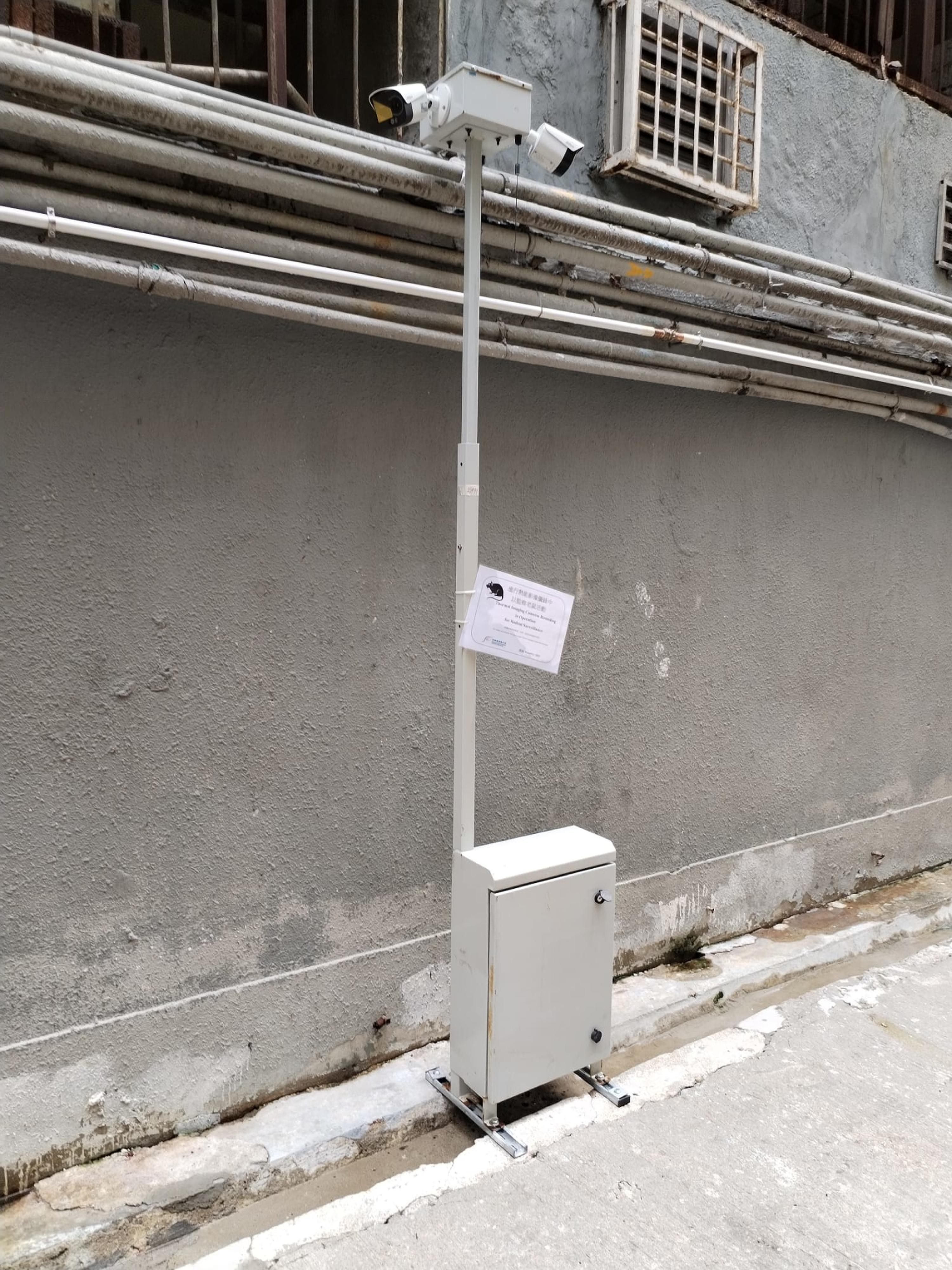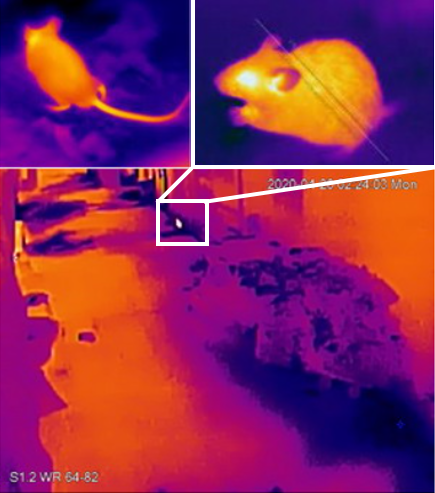The interdepartmental Pest Control Steering Committee (PCSC) held its 17th meeting today (February 2) to learn the latest progress in handling food waste by the Environmental Protection Department (EPD), to discuss the new rodent surveillance programme of the Food and Environmental Hygiene Department (FEHD), and to examine the work progress of departments since the launch of the Cross-sectoral Territory-wide Anti-rodent Action (the Action) at end 2022, as well as the anti-rodent work plan for the coming year.
The EPD's latest progress in handling food waste
In the meeting, the EPD introduced its work in promoting a food wise and waste less culture, and the collection and recycling of food waste. With a view to handling food waste in a sustainable and hygienic manner, separating food waste from general waste not only can utilise organic resources effectively, turning waste into energy and resources, it can also improve the surrounding environmental hygiene and help reduce food sources for rodents. In addition to providing free point-to-point collection services for premises with a larger quantity of food waste, the EPD is gradually installing smart food waste recycling bins with a sealed design and odour abatement function in all public rental housing estates across Hong Kong, as well as in private housing estates through funding projects, for residents to use. The EPD is also progressively setting up public food waste collection points (e.g. at the recycling stores GREEN@SHAM SHUI PO and GREEN@EASTERN) or community food waste mobile collection spots (e.g. in locations packed with eateries and in the vicinity of village houses or single-block buildings in Sha Tin District) in suitable venues to provide more convenient recycling options for the public. Furthermore, the EPD has set up fixed or mobile food waste collection points near street-level eateries clusters, such as refuse collection points under the FEHD, suitable street corners and rear lanes, using covered recycling bins to collect food waste from small-scale eateries. The EPD will explore more new technologies for food waste treatment suitable for use in Hong Kong, and continue to encourage the public and various sectors to participate in food waste recycling.
The FEHD's anti-rodent work
In the meeting, the representative of the FEHD reported its anti-rodent work in the past year. The work included increasing the number of overnight rodent control roving teams to 31, continuing the application of various anti-rodent new technologies and tools, and extending the trial scheme to allow licensed food premises to place temporary large-size waste containers in their adjacent rear lanes for temporary storage of waste, etc. To tie in with the Year-end Clean-up Campaign, from mid-December 2023 to February 2024, the FEHD has deployed additional 57 mini-street washing vehicle teams/high pressure hot water cleaner teams, 58 mobile cleansing teams, 37 overnight rodent control roving teams, 330 alcohol rodent trapping devices in its refuse collection points, and set up 205 temporary junk collection points in order to strengthen street cleansing services and enhance the effectiveness of anti-rodent work.
The PCSC noted that the FEHD caught a total of around 63 300 live rodents in 2023, which is about 40 per cent more than the 45 400 live rodents caught in 2022. If both live and dead rodents are considered, the FEHD caught a total of around 97 800 rodents, which is about 30 per cent more than the 77 200 rodents caught in 2022. The FEHD has conducted strategic anti-rodent operations at 108 priority rodent black spots throughout the territory and eliminated around 60 per cent of priority rodent black spots (a total of 70) in 2023, achieving the key performance indicator set out in the 2022 Policy Address.
In the forthcoming year, the FEHD will continue to conduct anti-rodent operations targeting priority rodent black spots, including 38 remaining black spots, and 59 newly identified black spots, with a view to achieving the target of reducing the number of black spots by 60 per cent by end 2024 as set out in the 2023 Policy Address.
Progress of the Action
Representatives of relevant departments reported their work taken under the Action. For instance, the Hong Kong Housing Authority has continued to implement the Anti-rodent Action in Estates in its public housing estates to strengthen daily cleaning and anti-rodent work, and has installed mobile surveillance systems in locations with serious rodent infestations to detect rodent activities, as well as adopting other new rodent control devices, etc. A new performance pledge has been implemented by the Housing Department (HD) in January 2024, requiring officers to arrive on the spot within two hours upon receiving a rodent complaint, and take follow-up actions as appropriate. Moreover, District Offices have incorporated anti-rodent services into the service contracts for providing cleaning services to the common areas of "three-nil" buildings on a need basis. All departments agreed to continue to strengthen rodent prevention and control measures in premises under their respective management, to strengthen internal monitoring and assessment of the outcome of rodent control work, and to actively encourage relevant sectors and stakeholders to co-operate with the Government's work, eliminating rodents' fundamental survival conditions of food, harbourage and passages from their respective areas.
The FEHD's new rodent surveillance programme
With a view to more accurately reflecting the situation of rodent infestation, the FEHD has earlier collaborated with a local university in studying the use of thermal cameras with artificial intelligence technology for monitoring rodent activities, in order to replace the original survey method using the ratio of sweet potato baits gnawed by rodents for generating the Rodent Infestation Rate (RIR).
Based on the trial results conducted in individual districts last year, starting from January 2024, the FEHD has been conducting a new Rodent Activity Survey (RAS) in all 19 districts of the FEHD across the territory in lieu of the original Rodent Infestation Survey (RIS). In each district, the FEHD will take into account factors including complaint figures, number of rodents caught, and views from local stakeholders, etc, to identify approximately 100 survey locations for installation of thermal cameras. Thermal images will be captured at every two-minute interval from 7pm to 7am for three consecutive nights. Artificial intelligence technology will then be used to analyse the images showing the presence of rodents. The FEHD will enumerate a Rodent Absence Rate (RAR) for each district, which is based on the number of thermal images with no rodent detected in all survey locations of the district out of the total number of thermal images taken. The FEHD will take targeted anti-rodent actions based on the RAR, and deploy more effective anti-rodent actions in black spots.
As per previous practice, the new rodent surveillance programme will be conducted biannually, with the first phase covering public areas where the FEHD provides pest control services. The survey will be extended to venues managed by other departments (including the HD and the Leisure and Cultural Services Department) depending on the actual circumstances.
The final RIS has been concluded in the latter half of 2023. During this period, the RIR is 3.5 per cent, which represents an improvement from the 4 per cent figure in the first half of 2023, and indicates that rodent infestation in public areas in the territory was not extensive during the survey period.
The meeting was chaired by the Under Secretary for Environment and Ecology, Miss Diane Wong. Participants of the meeting came from three policy bureaux and 20 government departments and organisations.
Follow this news feed: East Asia








